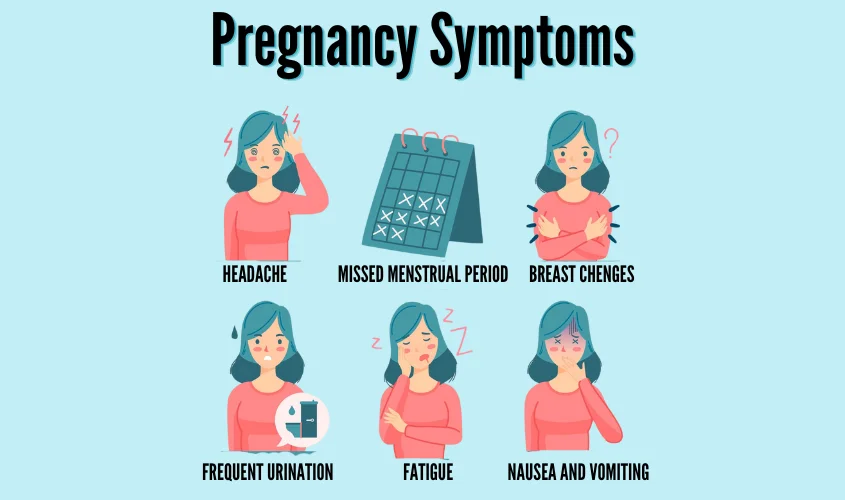
- 10.10.2024
- Planning for Pregnancy
Understanding Pregnancy Symptoms
Pregnancy symptoms can vary widely among women, but early signs often include missed periods, nausea, breast changes, fatigue, and frequent urination. Many of these symptoms may also result from other factors, such as stress or illness. If you suspect you might be pregnant, it’s essential to consult with your healthcare provider.
Signs of Pregnancy
Pregnancy brings significant hormonal changes, leading to various symptoms. Some women experience many symptoms, while others may notice only a few.
Common Early Pregnancy Symptoms
- Missed Period: Often the first sign of pregnancy, but some women may experience light bleeding around the time of their expected period.
- Nausea and Vomiting: Commonly referred to as “morning sickness,” this can occur at any time of day. Symptoms usually begin around the fourth to sixth week and may last until the 12th week or longer.
- Breast Changes: Breasts may feel fuller, tender, or swollen, with darkening skin around the nipples and more visible veins.
- Fatigue: Overwhelming tiredness is common due to increased progesterone levels, which help maintain the pregnancy but may also slow your metabolism.
- Frequent Urination: Increased fluid levels and pressure from the growing uterus lead to more frequent bathroom trips, particularly at night.
- Food Cravings: Pregnant women may crave certain foods and develop aversions to others, including some non-food items (a condition known as “pica”).
Other Symptoms of Pregnancy
As pregnancy progresses, women may experience a range of additional symptoms. While some of these symptoms are normal, it’s essential to monitor your body and consult a healthcare provider if any concerns arise.
Common Later Symptoms
- Backache: Back pain during pregnancy can affect more than one in three women, often due to changes in posture and loosening ligaments.
- Breathlessness: The hormone progesterone increases lung capacity, but the growing uterus may also press on the diaphragm, making breathing feel labored.
- Constipation: Pregnancy hormones can slow gastrointestinal movement, leading to infrequent or hard bowel movements.
- Hemorrhoids: Straining from constipation or the pressure of the baby’s head can lead to hemorrhoids, which usually resolve after birth.
- Headaches: Persistent headaches may occur and could be associated with conditions like pre-eclampsia. Seek medical advice if over-the-counter remedies do not alleviate your pain.
- Heartburn and Indigestion: The enlarging uterus can put pressure on abdominal organs, and progesterone may relax muscles, leading to digestive discomfort.
- Itchy Skin: Widespread itching can be caused by dry skin or stretching skin during pregnancy. Severe itching, especially on palms and soles, may require medical attention.
- Leg Cramps: Up to half of pregnant women may experience leg cramps, often at night, due to muscle contractions.
- Mood Changes: Hormonal fluctuations can lead to mood swings; some women may feel elated, while others may experience irritability or depression.
- Tingling and Numbness: Carpal tunnel syndrome, causing tingling in hands, affects many pregnant women due to fluid retention.
- Increased Vaginal Discharge: Some women notice a rise in vaginal discharge during pregnancy. If accompanied by itching or odor, consult a doctor.
- Varicose Veins and Leg Swelling: Increased blood volume and pressure from the uterus can lead to swollen legs and varicose veins.
When to Seek Medical Help
If you notice any of the following symptoms during pregnancy, contact your healthcare provider immediately:
- Vaginal bleeding
- Less fetal movement than usual
- Severe stomach pain
- Pain that doesn’t go away
- Leaking amniotic fluid (if your waters break)
- High temperature
- Persistent vomiting
- Unrelenting headache
- Blurred or lost vision
- Widespread itching
- Sudden swelling of the face, hands, or feet
Conclusion
Recognizing pregnancy symptoms is crucial for early intervention and support. If you suspect you are pregnant or experience concerning symptoms, consult your healthcare provider for further guidance and care.
For more information on preparing for pregnancy and related topics, explore our Planning for Pregnancy section.














